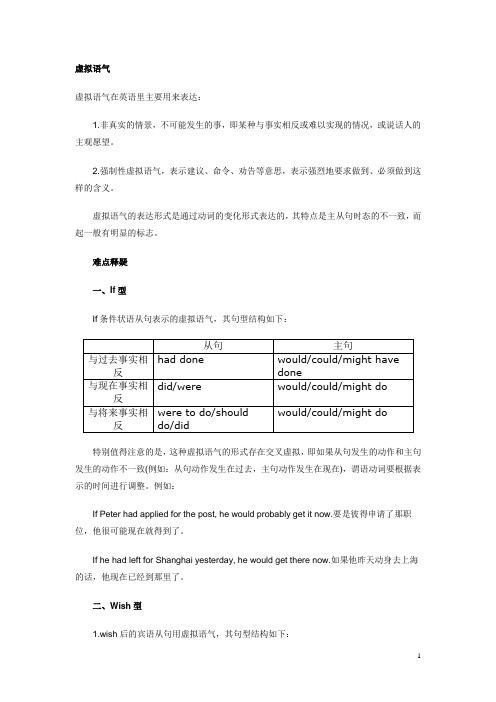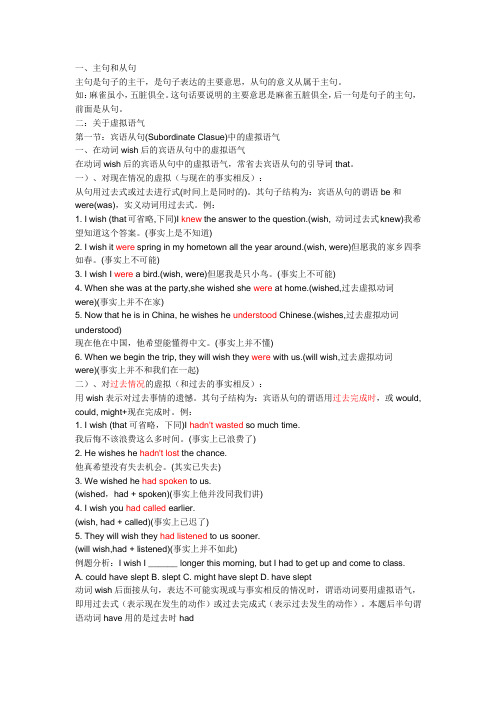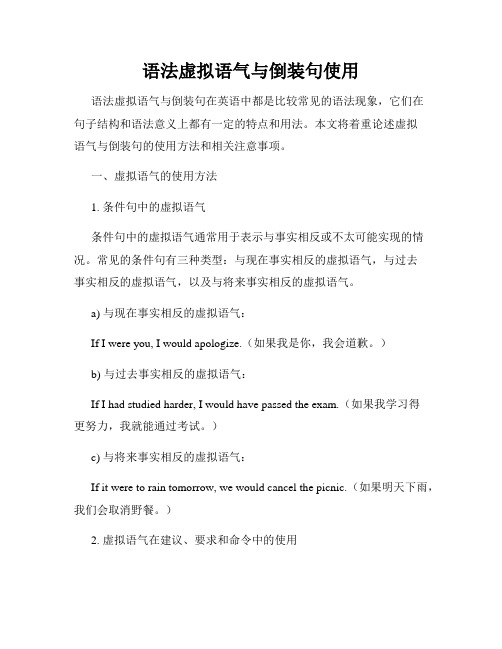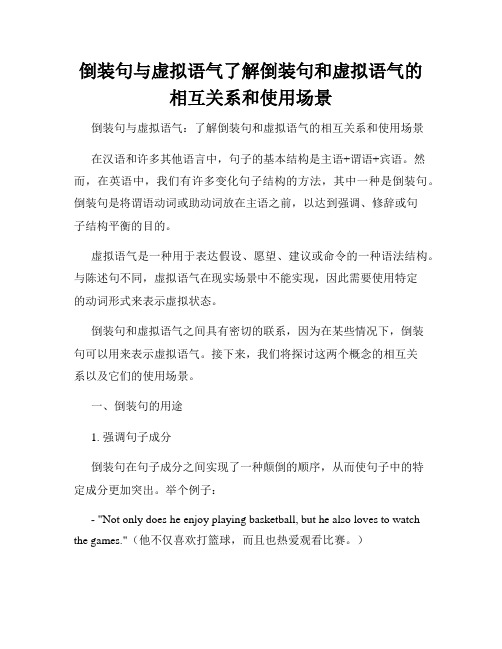虚拟语气和倒装
语法:虚拟语气和倒装句

虚拟语气虚拟语气在英语里主要用来表达:1.非真实的情景,不可能发生的事,即某种与事实相反或难以实现的情况,或说话人的主观愿望。
2.强制性虚拟语气,表示建议、命令、劝告等意思,表示强烈地要求做到、必须做到这样的含义。
虚拟语气的表达形式是通过动词的变化形式表达的,其特点是主从句时态的不一致,而起一般有明显的标志。
难点释疑一、If型If条件状语从句表示的虚拟语气,其句型结构如下:特别值得注意的是,这种虚拟语气的形式存在交叉虚拟,即如果从句发生的动作和主句发生的动作不一致(例如:从句动作发生在过去,主句动作发生在现在),谓语动词要根据表示的时间进行调整。
例如:If Peter had applied for the post, he would probably get it now.要是彼得申请了那职位,他很可能现在就得到了。
If he had left for Shanghai yesterday, he would get there now.如果他昨天动身去上海的话,他现在已经到那里了。
二、Wish型1.wish后的宾语从句用虚拟语气,其句型结构如下:与过去事实相反wish that 从句的谓语动词用had done与现在事实相反wish that 从句的谓语动词用did与将来事实相反wish that 从句的谓语动词用would/could do例如:I wish they would change the menu.他们要是改变一下菜单就好了。
I wish I hadn’t spent so much money.我要是没花那么多的钱就好了。
同样地,在as if/as though引导的宾语从句中和以if only引导的带有感叹色彩的虚拟语气句子中,谓语动词与wish引导的宾语从句中的虚拟形式相同。
2.由if only 引导的虚拟语气与过去事实相反if only 谓语动词用had done与现在事实相反if only 谓语动词用did例如:If only she had asked someone’s advice! 她要是征求了别人的意见就好了!3.由as if/as though 引导的虚拟语气与过去事实相反as if/as though谓语动词用had done与现在事实相反as if/as though谓语动词用did例如:He talks about Rome as if he had been there himself.谈论起罗马来就像他去过似的。
倒装句 虚拟语气

一.全倒装(主语与谓语位置置换)1 作状语的否定副词或介词短语置于句首谓语动词不及物主语是名词(here, there ,away ,out ,down ,in the box , on the ground)2 表语或者进行时的分词部分置于句首buried in the sand was an ancient temple.Growing on the hillside are various flowers.Among the people was the young woman.二. 部分倒装(助动词系动词或情态动词置于主语前)1. 否定副词置于句首(never ,seldom,rarely,scarcely,hardly, nowhere, few,little,)2. 含有no的短语置于句首(in no way, on no condition, at no time, by no means, under no circumstances, no longer) 不包括 in no time3. Not until + 状语(包括从句)置于句首引起主句或主体倒装4. only+ 状语(包括从句)置于句首5. so /such....that 结构中 so/such 短语置于句首So cold was the weather that we had to stayat home6. So + 助/系/情+主语(neither/nor)表人云亦云7. not only.... (倒装)but also8. no sooner... than Hardly... when9. 非真是条件句省略if 从句倒装10. as/ though 非主流的部分倒装(与事实相反的假设表达对未来的美好愿望或者过去的遗憾体现说话人的态度和情绪情感是人类语言复杂含义的表达应用普遍有深意和难度和难度需要有语境和场合)一. 用时态体现的虚拟原则:对现在时间虚拟—-对过去时间虚拟—-对一般将来时间虚拟—-范围范例:1. wish +宾从2. would rather3. as if二 . 用情态动词体现的虚拟should1 . 1 坚持2 命令3 建议4 要求 +宾从(should +动词原形)2. 第一条里的动词的名词或形容词出现在句中相关的名词性从句也一样虚拟3. it is necessary/ important/ strange/ no wonder... that (should )+do4. it is(about/ high)time (that) should do 或者 did其他情态动词对现在对过去should(not)could(not)mightwould(not)needn't三 . 非真是条件句的虚拟从句(用时态)主句(用情态动词)对现在对过去对将来主从句的时间不一致()*隐形虚拟withoutbut forif onlyotherwise。
虚拟语气和倒装句讲解

一、主句和从句主句是句子的主干,是句子表达的主要意思,从句的意义从属于主句。
如:麻雀虽小,五脏俱全。
这句话要说明的主要意思是麻雀五脏俱全,后一句是句子的主句,前面是从句。
二:关于虚拟语气第一节:宾语从句(Subordinate Clasue)中的虚拟语气一、在动词wish后的宾语从句中的虚拟语气在动词wish后的宾语从句中的虚拟语气,常省去宾语从句的引导词that。
一)、对现在情况的虚拟(与现在的事实相反):从句用过去式或过去进行式(时间上是同时的)。
其句子结构为:宾语从句的谓语be和were(was),实义动词用过去式。
例:1. I wish (that可省略,下同)I knew the answer to the question.(wish, 动词过去式knew)我希望知道这个答案。
(事实上是不知道)2. I wish it were spring in my hometown all the year around.(wish, were)但愿我的家乡四季如春。
(事实上不可能)3. I wish I were a bird.(wish, were)但愿我是只小鸟。
(事实上不可能)4. When she was at the party,she wished she were at home.(wished,过去虚拟动词were)(事实上并不在家)5. Now that he is in China, he wishes he understood Chinese.(wishes,过去虚拟动词understood)现在他在中国,他希望能懂得中文。
(事实上并不懂)6. When we begin the trip, they will wish they were with us.(will wish,过去虚拟动词were)(事实上并不和我们在一起)二)、对过去情况的虚拟(和过去的事实相反):用wish表示对过去事情的遗憾。
语法虚拟语气与倒装句使用

语法虚拟语气与倒装句使用语法虚拟语气与倒装句在英语中都是比较常见的语法现象,它们在句子结构和语法意义上都有一定的特点和用法。
本文将着重论述虚拟语气与倒装句的使用方法和相关注意事项。
一、虚拟语气的使用方法1. 条件句中的虚拟语气条件句中的虚拟语气通常用于表示与事实相反或不太可能实现的情况。
常见的条件句有三种类型:与现在事实相反的虚拟语气,与过去事实相反的虚拟语气,以及与将来事实相反的虚拟语气。
a) 与现在事实相反的虚拟语气:If I were you, I would apologize.(如果我是你,我会道歉。
)b) 与过去事实相反的虚拟语气:If I had studied harder, I would have passed the exam.(如果我学习得更努力,我就能通过考试。
)c) 与将来事实相反的虚拟语气:If it were to rain tomorrow, we would cancel the picnic.(如果明天下雨,我们会取消野餐。
)2. 虚拟语气在建议、要求和命令中的使用虚拟语气还可以用于表示建议、要求和命令等语气中,表示一种虚拟或非现实的情况。
常用的动词有recommend, suggest, insist等。
I suggest that he go to the doctor immediately.(我建议他立即去看医生。
)3. 虚拟语气在表达愿望和建议中的使用虚拟语气还可以用于表示愿望、希望和建议等语气中,通常使用“(should)+动词原形”来表达。
I wish I had more time to travel.(我希望有更多时间去旅行。
)二、倒装句的使用方法倒装句指的是将句子中的主语和谓语动词调换位置,主要有两种类型:完全倒装和部分倒装。
1. 完全倒装完全倒装是将整个谓语动词放在主语之前,通常在以下情况下使用:a) 表示地点、时间或方式的状语置于句首时:On the wall hung a beautiful painting.(墙上挂着一幅漂亮的画。
倒装句与虚拟语气了解倒装句和虚拟语气的相互关系和使用场景

倒装句与虚拟语气了解倒装句和虚拟语气的相互关系和使用场景倒装句与虚拟语气:了解倒装句和虚拟语气的相互关系和使用场景在汉语和许多其他语言中,句子的基本结构是主语+谓语+宾语。
然而,在英语中,我们有许多变化句子结构的方法,其中一种是倒装句。
倒装句是将谓语动词或助动词放在主语之前,以达到强调、修辞或句子结构平衡的目的。
虚拟语气是一种用于表达假设、愿望、建议或命令的一种语法结构。
与陈述句不同,虚拟语气在现实场景中不能实现,因此需要使用特定的动词形式来表示虚拟状态。
倒装句和虚拟语气之间具有密切的联系,因为在某些情况下,倒装句可以用来表示虚拟语气。
接下来,我们将探讨这两个概念的相互关系以及它们的使用场景。
一、倒装句的用途1. 强调句子成分倒装句在句子成分之间实现了一种颠倒的顺序,从而使句子中的特定成分更加突出。
举个例子:- "Not only does he enjoy playing basketball, but he also loves to watch the games."(他不仅喜欢打篮球,而且也热爱观看比赛。
)在这个例子中,倒装句"Not only does he"将主语"he"和谓语"enjoy playing basketball"的顺序颠倒,从而在句子中强调了主语。
2. 条件句中的倒装在条件句(if-clause)中,倒装句可以用来表达可能性、假设或很强的愿望。
例如:- "Had I known about the party, I would have attended."(如果我早知道宴会的事,我就会去参加了。
)这个例子中的倒装句"Had I known"以及后面的虚拟语气结构"would have attended"表达了与现实情况相反的假设。
高中英语高考语法知识整理复习(虚拟语气+倒装句)

高考英语虚拟语气一、虚拟条件句中的虚拟语气1、表示与现在事实相反的情况从句:If+主语+did (be动词用were)主句:主语+ should/would/might/ could + doIf I were you, I would take an umbrella.如果我是你,我会带把伞。
(事实:我不可能是你)If I knew his telephone number, I would tell you.如果我知道他的电话号码,我就会告诉你。
(事实:不知道)If there were no air or water, there would be no living things on the earth.如果没有水和空气,地球上就不会有生物。
(事实:地球上既有空气也有水)2、表示与过去事实相反的情况从句:If+主语+ had + done主句:主语+should/would/might/could+have doneIf I had got there earlier, I should/would have met her.如果我早到那儿,我就会见到她(事实:去晚了)。
If he had taken my advice, he would not have made such a mistake.如果他听我的劝告的话,就不会犯这样的错误了。
(事实:没有听我的话)3、表示与将来事实相反的情况从句:①if+主语+were to do②if+主语+should+do③if+主语+过去式(be动词用were)主句:主语+should/would/might/could+doIf he should come here tomorrow, I would talk to him.如果他明天来这儿的话,我就跟他谈谈。
(事实:不可能来)If there were a heavy snow next Sunday, we would go skating.如果下周日下大雪,我们就去滑冰。
虚拟语气、倒装
英语虚拟语气虚拟语气分三种情况来掌握:虚拟条件句。
名词性虚拟语气。
虚拟语气的其他用语。
一、虚拟条件句:条件句中表虚拟,时态后退是真理1、条件从句与现在事实不一致如:If I were you, I would study hard. If it rained, I would not be here now.2、条件从句与过去事实不一致,如:If the doctor had come last night, the boy would have saved.If I had not studied hard, I would have failed in the exam last term.3、条件从句与将来事实不一致,句型为:虚拟将来有偏方,were to/ should 来帮忙If it should rain tomorrow, we would stay at home.If I were to go to the moon one day, I could see it with my own eyes.If you missed the film to night, you would feel sorry.注意:If条件句中绝对不可出现“would”。
在条件句中如果出现were, had, should可省去if,将主语与这些词倒装,例如:Were/ had/should到句首,条件句中if走Had the doctor come last night, the boy would have saved.Were I to go to the moon one day, I would see it with my own eyes.Should it rain tomorrow, we would stay at home.二、名词性虚拟语气:虚拟用在名从中,should do 结构要记清;一个坚持insist两命令order, command,三个建议suggest, advise, propose四要求demand, require, ask, desire;句型:(should)+动词原形,注意:在这种句子中绝不出现“would”“must”“could”等。
虚拟语气和倒装
2)含蓄条件引导的虚拟语气
假设的条件由下列介词(短语)等引出
In the absence of, expect for, but for, without…
In the absence of gravity, there would be no air around the earth. 如果没有重力,地球就没有空气。 But for him, I would have been drowned. 要不是他,我就被淹死了。
部分倒装(助动词+主语+谓语)
• Only+状语位于句首 • Only then did I realize I was wrong.
• • • •
连接副词
When; where; why; how When rocket was invented is known to us all. It is know to us all when rocket was invented.
• 我们都知道火箭是什么时候发明的。 (when是从句的时间状语) • Why he killed her should be investigated. • How she will go to Beijing hasn’t decided.
我的建议是推迟会议。 My suggestion is that the meeting should be postponed. I suggested that the meeting should be postponed.
3)在 would rather后面的宾语从句中,从 句的谓语动词形式如下表:我宁愿…
全部倒装 (谓语+主语)
• 当副词In, on, out, up, down, away, here, there 等位于句首时 • There goes the bell. • Out rushed the girl. • In came a woman. • Away flew the bird. • 但主语为代词时则不倒装 • Here it is. • Away they went.
虚拟语气 倒装
四级语法辅导倒装㈠.英语句子的语序英语句子通常有两种语序。
一种是主语在前,谓语在后,称为自然语序(Natural order).大部分的句子都采用自然语序。
另一种则相反,谓语在前,主语在后,称为倒装语序(Inverted order).倒装语序又分为两类:1.全部倒装(Whole Inversion):指包括表语或状语在内的整个谓语放在主语之前,它的语序是:表语或状语+谓语动词+主语。
2.部分倒装(Partial Inversion)指谓语中的一部分,如助动词do,does,did,情态动词can,may,should,ought to,must 等,“有”动词have, 系动词be等放在主语之前,其余部分包括谓语动词仍在主语之后。
㈡.分类与应用1.疑问倒装英语的疑问句一般采用倒装。
e.g. Has he left me a book?注:疑问词作主语或修饰主语时,句子不必倒装。
e.g. What makes him think so?2.惊叹倒装在由what和how引起的感叹句中,表语常常放在主语之前;在旧式文学体裁的陈述句中常出现主谓部分倒装表示惊叹:在美国英语中,有时用疑问句的倒装形式表示感叹。
如:e.g. What a wide river it is!Did he look annoyed!3.假设倒装在非真实条件句中,如if被省略,had,were,should需与主语倒装。
如:Had you(=If you had) asked me, I would have told you the answer.( 与过去事实相反) 4.副词倒装⑴.全部倒装a. here, there, now, then 置于句首而主语不是人称代词时。
e.g. Then came a girl.比较:Then she came.b. 小品词(如out,in,away,off等)或拟声词置于句首时。
e.g. In came the girls talking and laughing.⑵.部分倒装a. 方式副词或often, many a time频度副词置于句首时。
虚拟语气、倒装句、独立主格
虚拟语气、倒装句、独立主格一.虚拟语气虚拟语气表示说话人的主观愿望、猜疑、建议或与事实不符的假设等,而不表示客观存在的事实。
虚拟语气是由句中的谓语动词的特殊形式表示出来的。
虚拟语气主要分为与现在事实相反,与过去事实相反以及与将来事实相反三个种类。
让我们一一来看下它们的结构和用法吧!1、表示与现在事实相反的情况从句:If+主语+动词一般过去时(Be动词用were)主句:主语+ should/would/might/could+do:If I were you,I would take an umbrella.如果我是你,我会带把伞。
(事实:我不可能是你)If I knew his telephone number,I would tell you.如果我知道他的电话号码,我就会告诉你。
(事实:不知道)If there were no air or water,there would be no living things on the earth.如果没有水和空气,地球上就不会有生物。
(事实:地球上既有空气也有水)If I had any money with me,I could lend you some.如果我带钱了,我就会借给你些。
(事实:没有带钱)If he studied harder,he might pass the exam.如果他再努力些,就能通过考试了。
(事实:没有努力)If I were you,I'd wear a shirt and tie.如果我是你,我就会穿衬衫和领带。
(事实:我并不是你)2、表示与过去事实相反的情况从句:If+主语+had+done主句:主语+should/would/might/could+have doneeg:If I had got there earlier,I should/would have met her.如果我早到那儿,我就会见到她。
- 1、下载文档前请自行甄别文档内容的完整性,平台不提供额外的编辑、内容补充、找答案等附加服务。
- 2、"仅部分预览"的文档,不可在线预览部分如存在完整性等问题,可反馈申请退款(可完整预览的文档不适用该条件!)。
- 3、如文档侵犯您的权益,请联系客服反馈,我们会尽快为您处理(人工客服工作时间:9:00-18:30)。
Little work was done yesterday
Neither has he called on her, nor will he do so.
但是当连接主语时不倒装
Not only he but also I have kept the secret.
as引导的让步状语从句要用倒装语序
n(不带冠词)/adj/ adv/ v+ as + subject + be/情 态动词 Child as he is, he knows a lot about the world. =Though he is a child, he knows a lot about the world.
only修饰的副词、介词短语或状语从句放于句 首时,主句要倒装. Only then did I know I was wrong Only in this way can you hope to improve your English. Only when the war was over in 1949 was he able to get back home.
• 6. wish, as if, would rather that, If only 后接从句 • 如果是对现在的虚拟,用一般过去时 • I wish I were a scientist. • 如果是对过去的虚拟,用过去完成时 • I would rather you had told him the news yesterday.
英语倒装句分为两种:
1、整个谓语在前的句子,叫 完全倒装。 Here comes the car. 2、部分谓语(情态动词、助动词、连系 动词)在前,谓语的主体部分仍在主语之 后的句子,叫部分倒装句。 Only then did he realize that he was wrong.
一、完全倒装 • 句首有 here, there, out, in, up, down, off, away 等表示地点,方位的副词时: • Out rushed a cat from under the table. 从桌子底下窜出一只猫来。 • There goes the bell. 铃响了。 • Up went the prices. 价格上涨。 • The door opened and in came Mr. Smith, our headmaster.
4. 只保留从句的虚拟语气 这种从句常表示一种不可能实现的愿望, 常用if only 引导。如: If only I hadn’t wasted the time in high school. 我要是上中学时没有荒废时间就好了。
5. 表示“建议、命令、要求、坚决做”等的虚拟语 气 表示“建议、命令、要求、坚决做”等动词的宾 语从句常用“(should) + 动词原形”虚拟结构。 表示“决定”、“主张”的动词主要有decide, insist, persist等;表示“要求”、“建议”、 “命令”的动词主要有demand, desire, require, request, propose, suggest, command, order 等。如: My parents advise I not watch TV too much. 我父母劝我不要看太多的电视。 The people in the stadium all persisted that James not present again.
在下列否定或半否定副词, 连词,词组放句首 作状语表示强调时。 never, hardly, scarcely, seldom, little, barely, rarely, few, little,nowhere, not until(只倒主句) by no means, at no time,in no way, not a, Hardly …when, No sooner….than,(只倒主句,主 句一般用过去完成时而从句用过去时。) neither… nor…(两个都倒) not only…(只倒前面)
由以上这些词变形的adj.和n.后的从句也用 虚拟 It is suggested that we should have a meeting on Wednesday. The suggestion is that we should have a meeting on Wednesday. 某些adj.后的从句也用虚拟 It is necessary/ natural/ important/ strange that sb should do sth.
如果后一个句子只是单纯的重复前面 思,则不倒装。 “It is hot today.” “So it is.”
句子的意
“He finished it on time.” “So he did.”
当前面的句子中主语、谓语或肯否定形式不同时, 则用so it is with….句型来表示。
Tom likes singing, but he doesn’t like dancing. So it is with Mary. Tom is clever and he studies hard. So it is with Mary.
2. 混合虚拟语气 有时条件从句和结果主句所表示的时间不 一致,这就要求主从句的时态根据实际的 时间概念来确定。如: If she had followed the teacher’s advice, she would be success all right now. 如果当时她听老师的话,她现在就成功了。
二、部分倒装
• 用于省去if 的虚拟条件句中 • Were there no air or water, there would be no life in the world.
• 在以so, nor, neither 开头的句子里 • He can swim. So can she. • He didn’t smoke, nor did he drink.
3. 含蓄条件句 含蓄条件句是指句中没有明显的虚拟条件句,而是利用其 他手段来暗示存在虚拟条件。这类隐含式虚拟条件句往往 都可以转化为if引导的条件句。常用来表示含蓄虚拟条件 的手段有: (1)介词(短语),主要有but for, without等。如: But for your help, I couldn’t finish the work on time. 要不是你的帮助,我不可能按时完成工作。 Without electricity, there would not be modern industry. 没有电,就没有现代工业。 (2)通过上下文,句中往往有 otherwise, or等词。如: I was very busy yesterday. Otherwise I would have come to see you. 我昨天很忙,要不然我就来看你了。
单数可数名词作表语提前不用冠词
Young as he is, he knows more than you.
倒装
倒装的目的: 语法结构的需要:通常疑问句、there be 结构等需 要用倒装句。例如: There is a bridge across the river. 河上有座桥。 Where are you going? 你上哪去?
ቤተ መጻሕፍቲ ባይዱ
语法修饰的需要:倒装句可以起强调作用,加强 语气。例如: Up went the model plane. 那架航模飞机飞起来了。 (强调状语)
表语提前,为了保持句子平衡
Gone are the days when Chinese people used foreign oil. Such is the case.
在某些祝愿句中。 • Long live the People's Republic of China! • May you succeed.
虚拟语气的几种特殊用法
1. 连词if 的省略 if 虚拟条件句中有should, had 或were时,if 可 以省略,将should, had 或were放在句首。如: Had I worked hard, I would have surely succeeded. 如果我当时努力学习的话,我当然会成功的。 Were she my daughter, I wouldn’t allow her to study abroad. 如果她是我的女儿,我就不让她出国学习了。
注:人称代词不倒装 Here you are. There he goes.
介词短语表方位放句首 From a speaker on the wall comes the doctor’s voice. On the ground lay a goat.
谓语通常是be , stand, sit , lie 等动词。
注:only 修饰主语时,不倒装.
Only he can do this work.
so…that/ such…that中 so+ adj./adv或 such…提前到句首时,此部分用倒装语序.
(例9)
So loudly did he speak that even people in the next room could hear him. In such a hurry did he leave that he forget to lock the door.
在以often, always, once, many a time, now and then, every other day, 等作状语 的频度副词位于句首时。 Often did I speak of him before. Many a time has he helped me with my experiment.
